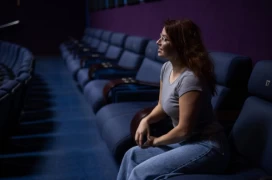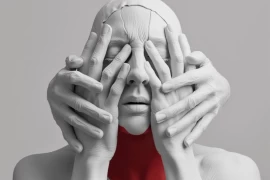
Grief Process and Intersecting Lives Film Analysis
- Grief Process and Intersecting Lives Film Analysis
When we think of grief, we usually associate it with the psychological responses stemming from loss or separation, often due to death. However, grief is our effort to adapt to the differentiation between our inner world and reality, caused by any loss or change.
Starting from the moment of birth and continuing throughout life, we experience changes parallel to the losses we encounter, mourning the past and adapting to new circumstances. For instance, when a baby is born, it must leave behind the life within the mother's womb. Another example is when a baby learns to walk, it must leave behind the comfort of being carried. The price to pay for new acquisitions is the ability to let go of the old. These transitions, in a secure environment, facilitate the transition of a baby into an adulthood capable of mourning loss and adapting to change. Our life becomes fulfilling to the extent that we can adapt to losses and use change as a tool for growth. Otherwise, we may become individuals consumed by grief, clinging to the past and expending all our energy on the mourning process.
As Vamık Volkan says, our grief is as personal as our fingerprints. Depending on our past losses, personality traits, and our relationship with what we have lost, we react differently. From this perspective, grief, a psychogenic wound, can be likened to a physical wound. For example, just as a small wound can endanger the health of a hemophiliac, a person who has not completed the mourning process for past losses and has relatively limited coping skills can be overwhelmed by a minor loss. Additionally, the grief of a relationship with ambivalent feelings and unresolved issues can be more challenging and prolonged than the grief of a healthy relationship.
Nevertheless, despite individual differences, the grief process fundamentally consists of two periods. The first is the crisis period, which begins with the loss or the threat of loss. During the crisis period, we go through stages such as denial, compartmentalization, bargaining, and anger as a means to avoid confronting the loss. Many people believe that the grief process is complete once the reality of death is accepted. However, the process from denial to acceptance is only the first stage of grief. To transform the relationship into a memory that no longer constantly affects us, we must also complete the second stage of grief, which involves evaluating and letting go of the relationship.
Generally, the initial response to loss is denial, which acts as a buffer helping us absorb the shocking and distressing reality. Rituals (such as funerals, condolences, memorial services, etc.), varying according to culture, assist in resolving denial by confronting us with the reality of death. As we progress from denial to acceptance, we also go through stages of compartmentalization, bargaining, and anger. During compartmentalization, while we accept the loss on one level, we continue to deny it on another. Compartmentalization is evident when we reach for our phone to call the deceased and then realize the futility of our action. As our awareness of the loss increases, we enter the bargaining stage, where we engage in thoughts like "I should have done this, I should have done that, I shouldn't have done this." Additionally, during the first stage of grief, as mentioned earlier, we also experience anger because, even if unintentionally, someone has abandoned us, prompting feelings of resentment. However, due to societal norms, we may struggle to find an outlet for our anger towards the deceased. We may redirect our anger towards others, such as blaming those responsible for an accident that caused the death or accusing the medical team of incompetence. The process from denial to acceptance involves stages such as denial, compartmentalization, bargaining, and anger, but these stages do not progress in a specific order. We may transition repeatedly between stages in our inner world. To use Vamık Volkan's analogy, this process is akin to a series of vaccinations administered to build immunity.
After acceptance, the second stage of grief begins, which involves evaluating and letting go of the relationship. We review the foundations of our relationship to fully understand what it meant to us, what we have lost, reliving happy memories, unmet expectations, unresolved issues repeatedly until we fully accept everything as it is.

When does grief end? In fact, we can never completely let go of anything that is important to us. Therefore, even if we complete the grieving process, it can flare up again during anniversaries, events reminding us of that person, or any significant moments when we need that person's support, approval, or appreciation. However, when these flare-ups reach a level that does not disrupt functionality, grief can be considered practically completed. When grief is completed, the individual's energy, desire to engage in life again, and motivation to reconnect with others return. Additionally, through identification with the lost person and internal introspections during the grieving period, the individual matures.
However, sometimes grief becomes complicated. While it is not entirely possible to predict the complexity of grief after a loss, some risk factors have been identified. These include insufficient coping skills, unresolved past grief, undergoing a process with other stressors present, having a relationship with unresolved issues with the deceased, unexpected sudden deaths, young age losses, deaths occurring violently, child loss, among others, which can invite complicated grief.
Now that we have generally discussed the grief process, let's move on to our film. Our film focuses on the grief process of a soldier (Marko) and those intersecting lives around him after he tries to stop his comrades from attacking a civilian (Haris) during wartime and is brutally killed by them in the middle of the street. We see that all characters are still experiencing unresolved grief processes, greatly influenced by the brutal and unexpected nature of the death. In cases of violent deaths, the illusion of the world being a safe place is shattered, making it more challenging to cope with such deaths. In sudden deaths, our illusion of being able to foresee and control the future is damaged, making it possible for grief to become complicated. The death in our film meets both of these criteria, making it prone to becoming a complicated loss.
Let's start with the father figure. Coping with the loss of a child is extremely difficult for parents. This is because parents assume the duty to protect their child from the moment of birth, and they feel intense guilt for not being able to protect them. Additionally, since the child has been included in their future plans since birth, they not only lose a loved one but also lose the expected futures. Returning to the father in the film, we see him as a cheerful, lovable old man before the incident, but afterward, he appears as a grim, angry figure with diminished self-care. The broken mirror in the father's bathroom at the beginning of the film can be interpreted as a reflection of his anger. His anger, initially directed towards household items (the broken mirror) and himself (diminished self-care), is redirected towards his son when the latter enters his life. In essence, his true anger is towards his son, who unintentionally abandoned him. However, until he vocalizes and accepts this, his anger finds expression in different outlets. It is only when he expresses his anger towards his son during a conversation with his son's doctor friend (he tells him that he wasted his life for his son) that a resolution begins to occur in his anger. Following this, there is a thawing in the father's anger. He allows his son to accompany him to the cemetery, even bringing him home afterward. Additionally, the scene where the father, who initially couldn't provide his forgotten cigarette to Marko at the beginning of the film (which started with Marko being unable to provide his last cigarettes to Todor due to Marko's forgetting his cigarettes at home, leading to Todor's anger at not being able to find cigarettes), gives a cigarette to the forgotten son can be interpreted as the father forgiving himself. By allowing the son to open the blinds of the house, symbolizing the beginning of the completion of the grief process, it is implied that the father channels his newfound energy, as the grief process begins to be resolved, into re-engaging with life.
Haris, the rescued civilian, is grappling with the unbearable weight of being saved. When Nadya, Marko's fiancée, escapes her abusive husband and seeks help from Haris, whom she feels indebted to for her rescue, he meets her at the station, hosts her in his home, and arranges accommodation and employment for her. Even for the arranged accommodation, he expresses embarrassment, saying, "I couldn't find anything better in two days." When Nadya thanks her employer for the job, and the employer suggests thanking Haris instead, Nadya's embarrassed gaze drops, indicating she did not expect such thanks from her. When Nadya's husband accuses her of being an alcoholic and neglectful of their child, Nadya takes a questioning stance for the first time in front of him, beginning to explain her situation by saying, "After what happened to Marko," but then quickly lowers her head and cannot muster the courage to inquire further. When threatened by her husband, she initially tries to solve the situation with lies, but upon realizing this won't suffice, she removes her husband and children from the house, sends Nadya and her son away from the city, and confronts the threatening husband. Identifying with Marko, who sacrificed himself years ago to save her, Nadya sacrifices herself for Marko's fiancée, whom he considered his legacy, and silently endures the violence of the angry man, just like Marko, without resisting. After this scene, feeling the peace of having paid the price for what happened years ago, she opens the window of the house. This scene symbolizes the completion of the grieving process, as with the scene where the father opens the shutters. The price is paid, the relationship is reviewed, and the chapter is closed.

Nadya's character, on the other hand, has left the scene of the incident, avoiding confrontation. After the incident, she has migrated elsewhere, and almost as if wanting to punish herself, she has married someone who mistreats her. To suppress the pain inside her, she resorts to soothing herself with alcohol. The only place she could go to escape her husband, we learn, is the place where her husband is forbidden to enter. However, instead of going there, she flees to Haris. When her husband finds her there, despite Haris's insistence, she initially makes excuses for not going to the town where the incident occurred, citing her son's lack of a passport. However, upon realizing that Haris could arrange a fake passport as a solution, she claims that her son doesn't have a photo. Despite Haris's efforts to overcome every difficulty, she is seen waiting at home, unprepared, on the day she is supposed to leave. When she finally agrees to accompany Haris on the journey, meaning she has accepted to confront her grief, we see that the ring, which had served as a connection object until then, becomes a memory object on the bus. Connection objects are generally chosen as objects that symbolize the moment of death or the last scene with the lost person. Nadya's connection object is the ring that Marko had given her when she last saw him. Connection objects serve to externalize the pain and create a sense of control over the helplessness felt in the face of death. The person knows where this object is, can look at it when they want, and can put it out of sight when they want. However, these objects are also used for secondary functions. Trying to control death by fully controlling this object, the person attempts to maintain the illusion of control over death. Throughout the film, Nadya is seen constantly tucking the ring, which is attached to a necklace end, into her blouse. When she decides to confront her grief, agrees to go to the scene of the incident, we see her take the ring out of the necklace to use it as a memory object that reminds her of the lost person. And with this, we see her turn her face out of the bus window, deciding to experience and complete her grief and open herself up to the outside world again.
We see Marko's doctor friend struggling with the guilt of witnessing the event and being unable to intervene, unable to complete his mourning. Ironically, Todor gets into an accident and is brought to the hospital where the doctor works. He reluctantly performs the initial emergency intervention. However, he feels a conscience conflict about performing another surgery. He wants to hear that Todor regrets his actions, but Todor is determined not to give him what he wants. Before the surgery, he feels the need to get permission from Marko's father. When the father says, "I don't care about that guy; he won't bring Marko back," the doctor decides to proceed with the surgery. However, he realizes from the father's language that he feels the same way inside, and the father offering alcohol to the doctor, followed by the doctor's response, "I can't, I need to drive. I must be at the hospital tomorrow," makes the doctor understand from the father's reaction that he cannot perform the surgery. In the same scene, when Todor says, "Your problem isn't with me, it's with yourself. You were there and did nothing to save your friend. You didn't lift a finger," he confronts his guilt. After facing this feeling, he begins to complete his mourning, seen when he goes out onto the balcony and opens up to the outside world.
While all these characters are struggling with grief, Todor's relaxed attitude stands out. Todor gives the impression of having antisocial traits and a narcissistic personality. In times when the law is absent, such as during wartime, he reacts with extreme responses due to not feeling the superego pressure, allowing his narcissistic fusion in his mind to dissipate. For instance, when he can't find his cigarette, he ransacks Haris's kiosk and starts beating him mercilessly. At this moment, when Marko, who used to restrain him, also receives a blow to his narcissistic fusion, he directs all his anger towards Marko, even causing his death. Due to his antisocial traits, he doesn't feel guilty because he lacks an internalized superego, and he can comfort himself by thinking, "I spent 2 years in prison, sent to the front lines."
As seen, each person experiences their loss in their own way, reevaluates their relationships, and mourns. With the hope that we can repair our losses and achieve maturity through mourning...

Spc. Dr. Tuba Öger
Psychiatrist





